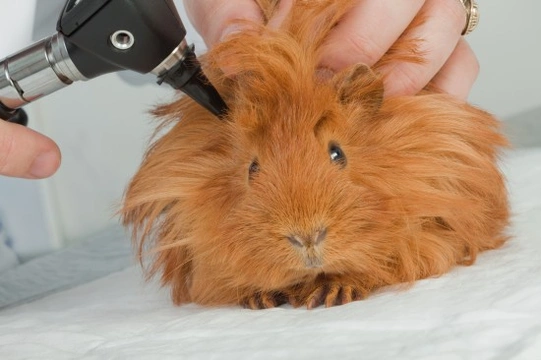
How to Deal with Ear Infections in Guinea Pigs
Fortunately, guinea pigs don't often suffer from ear infections but when they do the chances are it is because of some sort of bacterial infection namely a respiratory disorder or even pneumonia. Should an ear infection migrate from the middle ear to a guinea pig's inner ear, then things get very serious because not only is this an extremely painful condition for a little guinea pig to have to deal with, but it can also affect parts of their nervous system too. As such, you should always seek veterinary advice as soon as you can.
The Symptoms and Signs to Watch Out For
If you notice your guinea pig is not behaving like they normally do and are a little quieter than usual, you should give them a quick once over"" to see just what is wrong. Signs they may be suffering from an ear infection include the following:
- Pus or a smelly discharge may be coming out of their ears
- Your pet appears to be deaf in one or both ears
- When you touch your pet's ears, they are obviously in pain
Should the infection have spread from your pet's middle ear to their inner ear, there may be other symptoms to look out for which includes the following:
- Your pet starts walking in circles
- They may roll on the ground
- They hold their heads tilted to one side
- A loss of balance
What Causes Ear Infections in Guinea Pigs?
As previously mentioned, it is quite rare for a guinea pig to suffer from an ear infection. However, the condition can be triggered by the following:
- Some sort of bacterial infection
- A respiratory disease like pneumonia
Diagnosing the Condition
Obvious clinical symptoms help make a diagnosis that much easier but more in-depth tests would need to be carried out to determine if the infection has progressed to a guinea pig's middle ear. A vet would need to find out what is responsible for the infection which they would do by analysing bloods and any pussy discharge found in the ear which helps establish if it is a bacterial infection.
Treating the Condition
The first thing a vet would want to do is ease any pain and discomfort your guinea pig may be experiencing and they would do this by using local anaesthetic medication together with antibiotic ear drops. Following this, a vet would want to use either an antiseptic or antibiotic ear wash to remove any build-up and discharge that's present in the ear.
The All Important After-care
Once your guinea pig has received the necessary treatment for an ear infection, they would need lots of TLC during their recovery. You would need to make sure they are kept in a clean environment that's somewhere nice and quiet. You would also need to take your pet for a check up to make sure the infection is clearing up and to see if more prescribed ear drops would be needed.
How to Put Drops in Your Pet's Ears
You would probably have to continue putting ear drops in your guinea pig's ears and you should follow the instructions on how many drops and how frequently they should be administered. You need to carefully put the drops in your pet's ears by tilting their heads slightly and once the correct amount of drops have been put it, you need to hold their heads for a little while to prevent your pet from shaking the drops out again.
Preventing Ear Infections
It's really important for guinea pigs to be kept in a clean environment which helps reduce the chance of an infection taking hold. Regularly cleaning out cages and making sure they are placed in a nice, warm and dry environment will also help keep your pet nice and healthy, It is also essential for guinea pigs to be fed a well balanced and nutritious diet and to take them for regular health checks at the vet.
You should check your guinea pigs every 2 weeks to make sure they are nice and clean. However, if you own a breed that boasts very droopy and/or hairy ears, you should check and clean them on a weekly basis.
Conclusion
As you get to know your pet you soon notice their little routines and you get to know their characters too. This means when they are not feeling themselves, you pick up on the fact they are not well that much quicker. As with most health issues that affect cavies, an ear infection when picked up early enough is that much easier for a vet to treat. If the infection goes untreated and reaches their inner ear, this is not only very painful but the condition is that much harder to treat as well. Checking your pet's ears on a regular basis helps reduce the risk of an ear infection taking hold and handling them helps creating a strong bond with your cavy.
""



